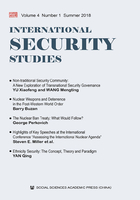
5 Conclusion
The “resource-induced” security dilemma is the essence of non-traditional security challenge and the major driving force for the building and development of the non traditional security community. The competition for “nonmilitary” resources such as ecological environment, cyber information, and public health will also exert an impact on the change of international order and international landscape. The non-traditional security threats throw humankind in “survival anxiety”. The ultimate solution is to construct the non-traditional security community at different levels to achieve the rebalance and co-sharing of resources under the guidance of “peace-cooperativism”. It can be said that the non-traditional security community is a valuable endeavor to practice the idea of “peace-cooperativism”. It will contribute to the building of a“community of shared future for mankind” to explore the embryo of the non-traditional security community at sub-regional, regional, and global levels and seek a scheme to deepen non-traditional security cooperation and construct the non-traditional security community in accordance with the rational principle of “social co-possession, right sharing, peaceful co-existence, and value co-creation”.
With the constant change of the world landscape and the increase of China's comprehensive strength and international influence, it is a responsible major country's logical choice and responsibility to participate in regional and global security governance. In its participation in global governance, China needs the acceptance and endorsement of the international community and other countries in addition to its own strength and efforts. It is a flexible and effective way for China's involvement in global governance to actively build the non-traditional security community and resolve the tension of traditional security through non-traditional security cooperation.
Translated by Fan Xinzhi
Edited by Anthony Alonso, Zhang Guoshuai, Xie Lei